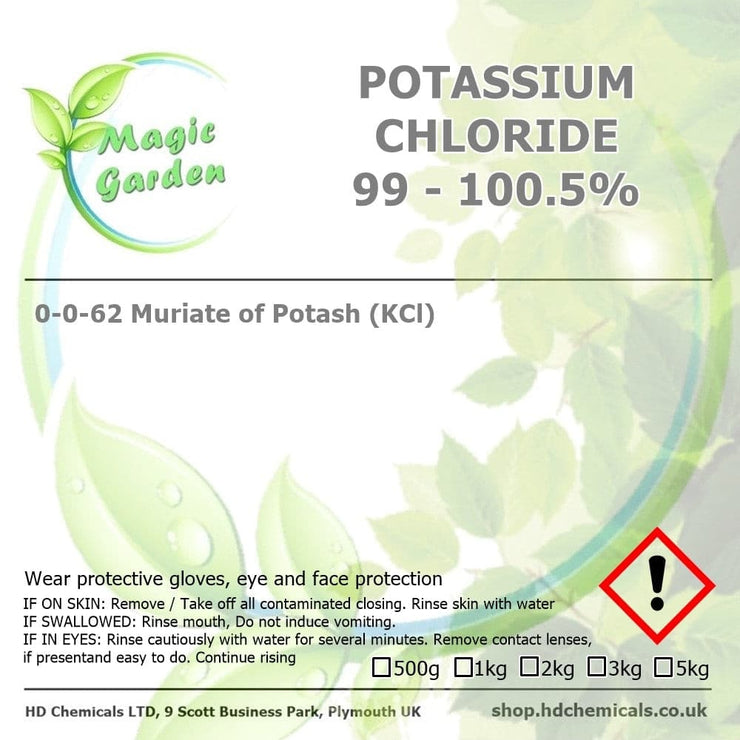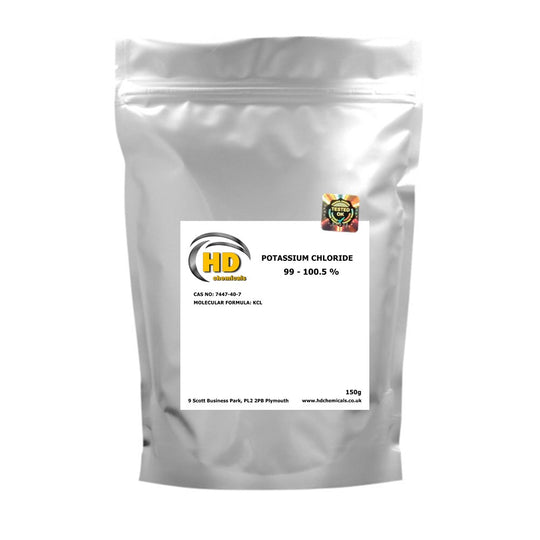Potassium Chloride for Gardens and Beyond
In the realm of household and gardening solutions, potassium chloride emerges as a versatile and eco-friendly option that offers a myriad of benefits. From promoting plant growth to enhancing water softening capabilities, this compound has proven its worth in various applications. In this comprehensive guide, we will explore the numerous advantages of using potassium chloride in both household and garden settings.
Understanding Potassium Chloride:
Before delving into its applications, let's take a moment to understand what potassium chloride is. Potassium chloride, often represented as KCl, is a chemical compound made up of potassium and chlorine ions. It occurs naturally in the earth's crust and can be found in mineral deposits. In its pure form, it appears as a white crystalline powder and is commonly used in fertilizers, food additives, and as a water softener.
Potassium Chloride in Gardening:
-
Enhanced Plant Growth: Potassium is an essential nutrient for plants, playing a crucial role in various physiological processes. Potassium chloride fertilizer provides plants with a readily available source of potassium, promoting healthy growth, improving root development, and enhancing overall plant vigor. This is particularly beneficial for flowering plants, fruits, and vegetables.
-
Improved Soil Structure: Potassium chloride can help improve soil structure by promoting flocculation, which means that soil particles bind together to form larger aggregates. This enhances the soil's water retention capacity and aeration, creating an optimal environment for plant roots to thrive.
-
Disease Resistance: Plants fortified with potassium are more resilient to diseases and stress. Potassium chloride strengthens cell walls, making plants less susceptible to infections and adverse weather conditions. This results in healthier and more robust plants that are better equipped to withstand environmental challenges.
-
Fruit Quality and Yield: The application of potassium chloride has been linked to increased fruit quality and yield. It enhances the synthesis of sugars and starches in plants, leading to improved flavor and nutritional content in fruits. Additionally, higher potassium levels contribute to better flowering and fruit development.
-
pH Regulation: Potassium plays a role in regulating the pH of plant cells. By maintaining the appropriate pH levels, plants can efficiently absorb nutrients from the soil. This ensures that the plants have access to the essential elements needed for their growth and development.
Potassium Chloride in Household Applications:
-
Water Softening: One of the most common household uses of potassium chloride is as a water softener. In regions with hard water, which contains high levels of calcium and magnesium ions, potassium chloride can be used as an alternative to sodium chloride in water softening systems. This is especially beneficial for individuals looking to reduce their sodium intake or for those concerned about the environmental impact of sodium discharge.
-
Ice Melt and Deicing Agent: Potassium chloride is a safer alternative to traditional ice melt products that use sodium chloride or calcium chloride. It effectively melts ice on driveways and sidewalks while posing fewer risks to pets, plants, and the environment.
-
Food Preservation: In food processing, potassium chloride is used as a salt substitute. It imparts a salty taste to food while reducing sodium content. This makes it an excellent option for individuals on low-sodium diets or those looking to make healthier food choices.
-
Fire Extinguisher Agent: Potassium chloride is also employed as a fire extinguisher agent, particularly in Class K fire extinguishers designed for kitchen fires involving combustible cooking media like oils and fats.
-
Health Benefits: Beyond its applications in gardening and household products, potassium chloride offers health benefits. Adequate potassium intake is essential for maintaining proper heart and muscle function, regulating fluid balance, and supporting nerve communication.
Environmental Considerations:
-
Reduced Environmental Impact: Potassium chloride's use in gardening and household applications can contribute to a reduced environmental impact compared to alternatives. Its eco-friendly nature makes it a sustainable choice for individuals seeking greener solutions.
-
Soil and Water Conservation: By enhancing soil structure and water retention, potassium chloride helps conserve water and reduce the need for irrigation. This is particularly valuable in regions facing water scarcity or drought conditions.
-
Safer for Wildlife: Compared to traditional deicing agents, potassium chloride poses fewer risks to wildlife. Its use in gardens and landscapes minimizes the potential harm to plants and animals, making it a responsible choice for environmentally conscious individuals.
In conclusion, potassium chloride stands out as a multifaceted solution with a plethora of benefits for both household and garden applications. From fostering plant growth to serving as a safer alternative in water softening and deicing, its versatility and eco-friendly attributes make it a valuable asset in various settings. As we strive for sustainable living practices, embracing potassium chloride in our homes and gardens is a step towards a healthier, more environmentally conscious future.


